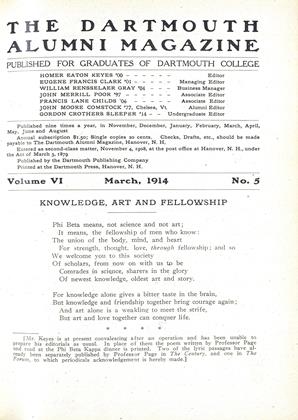The Summer Session for 1914 will open on Monday, July 8, with varied and increased resources. Many courses of the regular college curriculum will be offered; and there will be exceptional provision for students and teachers of chemistry, economics, dramatic literature, the fine arts, music, and education. For the first time in several summers, advanced students of chemistry will have opportunity to do work in quantitative analysis under the direction of Professor E. J. Bartlett. Professor Wicker will conduct courses in vital present-day problems of labor and finance. Dean Ruediger, of The George Washington University Teachers' College, will offer instruction in the general theory of education; and Superintendent Bardwell, of the New York City High Schools, will deal with its specific problems in elementary and secondary institutions.
The Department of English has been enlarged, and will include Professor Emery and Mr. Follett of Dartmouth, Professor Tatlock from the University of Michigan, and Mr. Crawford from Yale University. It will offer (1) material of broad appeal in Shakespeare, selected masterpieces, and the poetry of the nineteenth century; (2) unusually detailed work in recent Continental drama, recent and current fiction, and the technique of composing plays; and (3) graduate courses in pre-Chaucerian literature, Shakespeare, and theory of the drama. The work in dramatic literature and composition will assume added significance in correlation with courses in the study and production of festivals, the professional performances of the Coburn Players, and at least two amateur plays by members of the Session in the new Little Theatre in Robinson Hall.
A new emphasis on advanced work is shown by the offering of strictly graduate courses, designed primarily to meet the needs of candidates for the Master's degree. In this Session, three departments, English, Education, and Mathematics, have each one or more courses to which only students of graduate grade are admitted. As in former years, large opportunities will be afforded for advanced study in mathematics, additional facilities being provided this year for high school teachers of algebra and geometry.
The usual variety of courses will be given in the languages, physics, and history. In the Department of Fine Arts, Professor Zug is offering an introductory course in General History and Criticism, and another more advanced in French and American Painting. Professor Sleeper, head of the department of Music in Smith College, will give work in Theory and in the History of Modern Music.
 View Full Issue
View Full Issue
More From This Issue
-
 Article
ArticlePROFESSOR LORD'S HISTORY OF DARTMOUTH COLLEGE, 1815-1909*
March 1914 By Herbert Darling Foster -
 Article
ArticlePHI BETA KAPPA CELEBRATION
March 1914 -
 Class Notes
Class NotesCHICAGO ASSOCIATION
March 1914 By WM.H. GARDINER '76 -
 Article
ArticleTHE HAZING PROBLEM IN 1765
March 1914 By ELEAZAR WHEELOCK., Yrs.E.W. -
 Article
ArticleDISCIPLINE IN THE FRESHMAN CLASS
March 1914 By R.W. Husband -
 Class Notes
Class NotesLOCAL ASSOCIATIONS
March 1914
Article
-
 Article
ArticlePRESIDENT WILSON IN HANOVER
-
 Article
ArticleWheelock Memorial
December 1943 -
 Article
ArticleBest Class Treasurer
August 1946 -
 Article
ArticleBulls, Bats, and The Prince of Darkness.
SEPTEMBER 1994 By Proeessor Walter Stephens -
 Article
ArticleNeed a Change of Pace?
April 1952 By PROF. HERBERT W. HILL -
 Article
ArticleDAILY EXTENDS INVITATION
January 1940 By R. E. Glendinning '40


